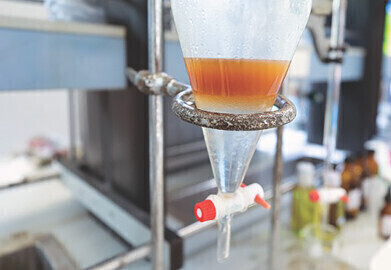Biofuel Industry News
Case Study on Standards: Biodiesel Fuel Blend
Nov 01 2023
As part of its 125th anniversary celebration, ASTM International invited case study submissions from committee members around the world, highlighting standards that have made a significant impact in society – and that have bettered the world around us. Numerous exceptional submissions were received, making the work of ASTM’s panel of judges even more difficult in narrowing down the list to eight winners.
Standardisation News is publishing all eight winning entries in 2023. We continue the series with a standard for biodiesel fuel blends from the committee on petroleum products, liquid fuels, and lubricants (D02): Standard specification for biodiesel fuel blend stock (B100) for middle distillate fuels (D6751).
Identify the need for the development of this standard: What problem was this standard trying to solve? Who initiated the development of the standard?
During the 1980s and 1990s, the United States and other countries throughout the world became increasingly aware of the need for cleaner burning transportation fuels to help mitigate greenhouse gas emissions/climate change as well as reduce global dependence on fossil fuels. The first commercial production of biodiesel in the U.S. occurred in 1991, and biodiesel volumes increased over the next few years – enough that it was soon realised product quality would be critical to biodiesel’s success going forward. This meant there was a real need to develop a robust, fit-for-purpose specification for biodiesel that would need to be internationally accepted/recognised by those entities associated with the energy and fuels sector.
ASTM International was designated as the best and most obvious standards-development organisation to begin the monumental task of developing a new and critical fuel specification for adopting biodiesel on a global scale. To this end, a Biodiesel Task Force was developed in committee D02.
After rigorous vetting with a variety of fuel-industry stakeholders such as original equipment manufacturers (OEMs), biodiesel producers, and many others such as state-level regulators, the provisional specification for biodiesel fuel (B100) blend stock for distillate fuels (PS121) was approved to provide initial guidance on minimum requirements for an acceptable and consistent biodiesel product (this was the last provisional standard approved by ASTM). After more technical debate, the first full specification for biodiesel was approved (D6751). More than 50 changes have been made since then, with 26 new designations due to research and “real-world” insights from all sectors involved on a “day-to-day” basis with the energy and fuels industries. These changes have helped ensure biodiesel fuel quality meets all OEM and customer requirements and needs – leading to the current version of the standard.
Identify the interest groups that participated in the development and/or revision to the standard
Interest group participation was wide ranging: OEMs, government officials, state regulators eager to have a consensus-derived standard to adopt into their fuel-quality regulations, fuel producers (both petroleum refiners and biodiesel producers), researchers, and a broad range of representatives all providing guidance on test methods and needed parameters and specification limits.
How is this standard commonly used by industry?
The standard has been adopted as the state standard for biodiesel in almost every U.S. state, as well being incorporated by the U.S. Environmental Protection Agency (EPA) into their governance associated with the Renewable Fuel Standard (RFS). To qualify as an alternate fuel for inclusion in the RFS, biodiesel must first meet the D6751 specification. In addition, there are 30 countries that adopt, reference in regulation, cite as a normative reference, or otherwise use the standard as a basis for their national standards for biodiesel. Producers use this specification for minimum product quality production and fuel purchasers have referenced this specification in their sales agreements. OEMs specify the standard as minimum for use in their equipment, and regulators sample and test biodiesel in commerce to ensure fuels meet these specification limits. In effect, D6751 controls biodiesel properties from production lots to the fueling ports of the end user. It is also the “backbone” of the current voluntary, nationally accepted biodiesel-quality program BQ-9000, which is directed at producers, marketers, and laboratories responsible for fuel quality from production through end-use.
How has the standard
impacted health and safety?
By establishing a consensus-driven, fit-for-purpose biodiesel specification, biodiesel became the first commercially available advanced biofuel (designated by the EPA in the RFS) in the U.S. Biodiesel generates less greenhouse gas emissions and less particulate matter, lower CO, and unburned hydrocarbons than conventional petroleum-derived diesel fuel. Published data supports that the use of biodiesel specifically decreases cancer risk, fewer premature deaths, reduced asthma attacks, and fewer lost workdays (1). In terms of safety, biodiesel in its pure form (B100) causes less biological damage to the environment than petroleum diesel if spilled or released and is safer than diesel fuel, as it is less combustible (i.e., higher flash point). This makes it safer to handle, store, and transport.
How do consumers and the
public benefit from these standards?
The standard provides an internationally recognised way to ensure the fuels used for transportation and/or home heating will perform as expected when biodiesel is used. Biodiesel use greatly impacts environmental justice in areas where the product is used in diesel engines and heating oil systems.
Can you provide any data to support the safety, economic or other impacts of the standard? If yes, please summarise the data and provide citations.
Researchers estimate that switching to 100% biodiesel in 28 transportation and home heating oil sectors studied would provide immediate community health improvements that include the following (1):
• More than 456,000 fewer/reduced asthma cases per year
• More than 141,000 fewer sick days per year
• Cancer cases reduced by nearly 9,500 (over a 70-year timeframe)
• The prevention of more than 910 premature deaths per year
• A total of $7.7 billion in avoided health costs annually
• A 45% reduction in cancer risk when legacy heavy-duty trucks use B100, and an 86% reduced risk when biodiesel is used for home heating oil.
Also, being derived from vegetable oils, biodiesel made to this standard is naturally non-toxic. The acute oral LD50 (lethal dose) of biodiesel is more than 17.4 g/Kg. By comparison, table salt (NaCl) has an LD50 of 3.0g/Kg, making table salt six times more toxic. In an aquatic environment, biodiesel has been proven to be 15 times less toxic to common species of fish than diesel fuel. In both soil and water, biodiesel degraded at a rate four times faster than regular diesel fuel, with nearly 80% of the carbon in the fuel being readily converted by soil and water-borne organisms in as little as 28 days. (2)
Are you aware of any regulatory adoption (domestic or international) or broad international use of the standard? If yes, please provide details
As noted, D6751 has been adopted as the state standard for biodiesel in almost every state, as well as by the U.S. EPA. In the RFS, to obtain payments for renewable identification numbers (RINs), the original biodiesel fuel must meet this standard. In addition, there are 30 countries that adopt, reference in regulation, cite as a normative reference, or otherwise use this standard as a basis for their national standards for biodiesel.
44 states and one county of a 45th state have adopted D6751 as their biodiesel quality specification.
EPA Regulations under CFR Part 1090.95 incorporate D6751 by reference.
Countries referencing the standard: New Zealand, Croatia, Sri Lanka, Uruguay, Ecuador, Tanzania, Saudi Arabia, Indonesia, Jamaica, Egypt, Columbia, Malaysia, Ethiopia, Israel, El Salvador, Honduras, Nicaragua, UK, India, UAE, Vietnam, Rwanda, Mozambique, Philippines, Zimbabwe.
Does this standard address any of the 17 United Nations Sustainable Development Goals?
SDG 7: Affordable and Clean Energy. Biodiesel is a proven renewable and sustainable alternate fuel with many positive attributes relating to energy, environment, and economics. It has been proven to reduces greenhouse gas emissions by an average of 74%, hydrocarbon emissions by 67%, and it returns 3.5 units of renewable energy versus a unit of fossil energy when compared to petroleum-based fuels. Because biodiesel can be produced from a wide variety of feedstocks (i.e., fats, oils, and waste greases) it can adapt to market conditions and provide a cost-effective and reliable energy source.
SDG 11: Sustainable Cities and Communities. Biodiesel is typically used in diesel-based motor transport, but also has applications as an alternate for petroleum-derived fuels used in home heating oil, rail, and marine applications, as well as a replacement for heavier petroleum fuels (i.e., No. 4 and 6) or natural gas for electricity production. In many areas of the world, significantly large populations are in close proximity to these transport and end-use modes and the use of biodiesel has been demonstrated to provide “real-world “tangible benefits for energy and environmental sustainability.
SDG 12: Responsible Consumption and Production. Biodiesel is currently produced from a wide range of fats, oils, and waste greases that, in general, do not compete with conventional food resources and have demonstrated flexibility in their ability as readily available feedstocks for sustainable fuel production.
Please provide any additional information here
The success of D6751 has enhanced the acceptance of biodiesel in blends of 5 to 20% (and higher) by volume in a number of energy-based sectors. The standard specification for diesel fuel (D975) allows up to 5% by volume of biodiesel, which has been a suitable replacement to restore lubricity lost when the nation transformed to ultra low sulfur diesel. In addition, the standard specification for fuel oils (D396) and the standard specification for diesel fuel oil, biodiesel blend (B6 to B20) (D7467) were both undertaken and accepted due to having an internationally accepted standard for biodiesel as a blend stock. These standards have proven valuable to the transport and energy-delivery sectors as a majority of OEMs now approve and support their engines for biodiesel blends of up to 20% by volume. â–
References
1. “Assessment of Health Benefits from Using Biodiesel as a Transportation Fuel and Residential Heating Oil,” Trinity Consultants, 2022.
2. Peterson, Charles and Moller, Gregory. “Biodegradability, BOD4, COD and Toxicity of Biodiesel Fuels,” University of Idaho Biodiesel Education Program.
Digital Edition
PIN 25.3 June/July
June 2024
Analytical Instrumentation - Recent Advances In Various Bench Scale Accelerated Oxidative Testing Methods For Fuels - Petrochemical Industry: Anton Paar Solutions Streamline Processes, Reduce H...
View all digital editions
Events
Jul 30 2024 Jakarta, Indonesia
Jul 30 2024 Jakarta, Indonesia
China Energy Summit & Exhibition
Jul 31 2024 Beijing, China
Jul 31 2024 Chengdu, China
Aug 05 2024 Moon Township, PA, USA


















